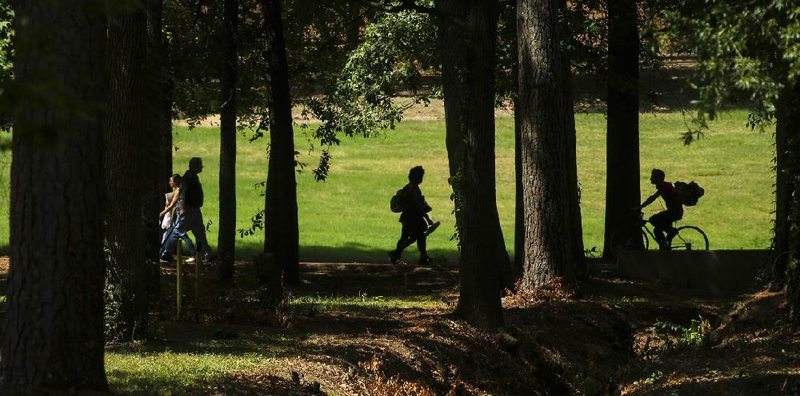The University of Arkansas at Little Rock will not hire anyone or purchase anything for which bids have not already been sought until the next fiscal year, administrators decided this week.
UALR Chancellor Andrew Rogerson announced the freeze Thursday in a five-paragraph memo to department budget heads.
"UA Little Rock, as with most in higher education, has faced challenging financial times in the past and should expect to in the future," Rogerson wrote. "Though none of these experiences are easy, we always come back strong and continue on with our mission."
University leaders said Friday that the decision, first reported in an Arkansas Times blog, is a measure of "fiscal responsibility" and happens frequently at colleges.
Alisha Lewis, a spokesman for the Arkansas Department of Higher Education, could not say Friday how common such freezes are across Arkansas, but she said University of Arkansas Cossatot Community College, where she once worked, instituted similar freezes and that other University of Arkansas campuses did, too.
UALR instituted a hiring freeze last fall for any staff that wasn't "mission critical," which Steve McClellan, vice chancellor for finance and administration, said was "loosened up" as the year went on.
Freezes at the beginning of school years are not as common, Lewis said. "That would be very different."
UALR has struggled with a drop in enrollment of thousands of students in recent years. Enrollment in the fall of 2018 was 10,525, down from 13,176 in 2010, according to Arkansas Department of Higher Education comprehensive reports.
Last fall, the university cut maintenance budgets and temporarily placed a cap on travel while facing a $9 million budget deficit for the 2018-19 school year, the Arkansas Democrat-Gazette previously reported.
Rogerson told the Arkansas Democrat-Gazette on Friday that the university's revenue projections from tuition and fees appeared to be too high. Not as many students are taking as many credit hours as anticipated, he said.
"We're just being careful," Rogerson said.
The school could revise that based on its next monthly budget meeting, Rogerson said. The university will be able to pay for everything currently promised, such as salaries, he said.
"As we started to make sure we came in on budget in terms of operating, we felt it was prudent to slow down spending for the next two months and put the brakes on until we get an update on where we are," Rogerson said.
The chancellor said he doesn't expect the freeze to affect hiring much. The university will still advertise for positions and recruit, but people won't be able to begin until July 1 or later. New faculty members wouldn't start until late August anyway, he said.
Most of the budget had already been allocated by April, McClellan said, noting that the school year will only last about another month. The freeze prevents departments from doing last-minute spending to make sure they have zeroed out their budgets before the next year's budgets are approved, he said.
The school's budget for the year was $173 million, down from previous years, McClellan said. About $67 million comes from state appropriations, and nearly all of the rest comes from tuition and fees. McClellan said he's still gathering department budget proposals for the next fiscal year and can't say to what extent he'll factor in this end-of-year freeze in his budget proposal for the next fiscal year.
UALR leaders will present that proposal to the University of Arkansas board of trustees in May at the board's meeting at the university.
McClellan said he expects revenue to be flat next year. He and Rogerson said it's too early to tell what enrollment will look like next year.
Opinions on why enrollment has dropped are "mixed," McClellan said. Many students may be going part time instead of full time because they are working and living at home while enrolled, he said. That is more common in more urban university settings, he said. He called it a "non-destination" campus.
This winter, a committee of UALR faculty and staff members made recommendations on better operation of the university as enrollment declines and budgets tighten after a review of 241 programs.
The report by the Institutional Effectiveness Committee, made up of 24 faculty and staff members, focused on efficiency and aligning university operations with the school's overall strategic plan. A major focus of the plan is increasing enrollment to 15,000 students.
The report is the first of the committee's four phases. The committee is designed to create a "clearinghouse" for university planning. Later this year, the committee will form policies and procedures for budgeting in accordance with its plans and recommendations.
Then, this year and in 2020, the committee will implement those policies and procedures for fiscal 2021. The final phase will start in the spring of 2020, integrating the university's research and reviews into its planning on a regular basis.
The report found effectiveness lacking in the admissions and recruitment office and noted high turnover and low "stakeholder satisfaction" in that office and in the financial aid and scholarships office.
A Section on 04/06/2019

